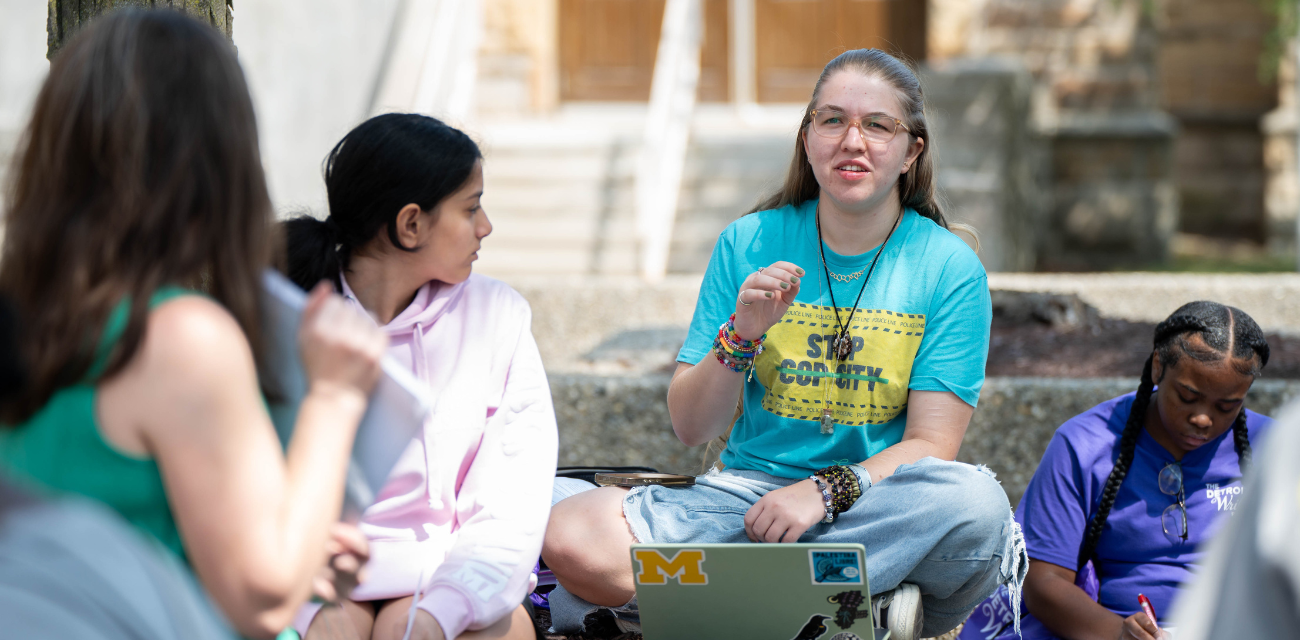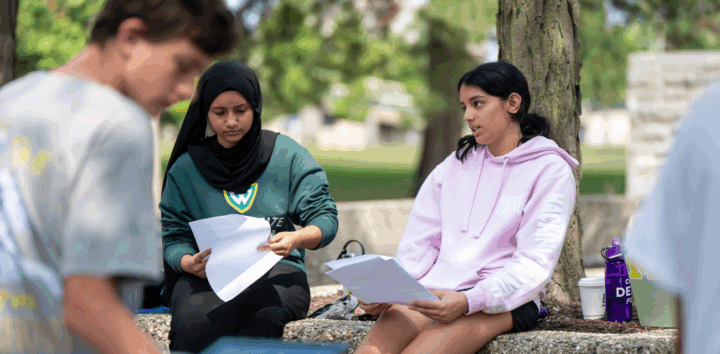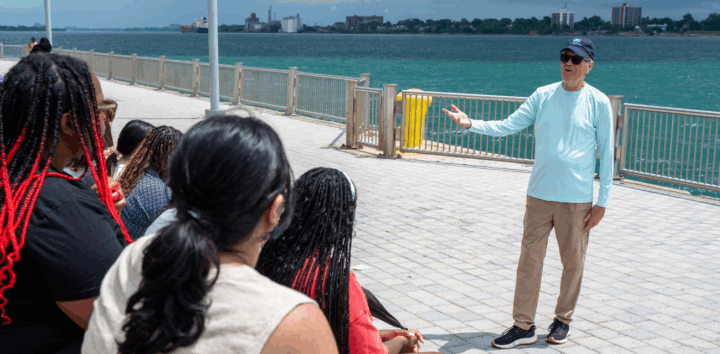Truth, justice win over students at ECOprize-funded journalism camp

Authored by
Truth and justice were awarded last fall in northern Michigan, and they were put to pen, paper and word processor a few months later in Detroit.
Members of the Michigan Environmental Council gathered in October 2024 for their first-ever ECOsystems Conference. Amidst the sessions, networking and stunning views, dozens of people voted in the ECOprize contest.
Three member groups each came away with $10,000 in prize money, courtesy of the posters they submitted and displayed at the venue, each showcasing a project they were hoping to create or expand.
One of the winners was Planet Detroit, a news organization informing readers about the environment and public health in Detroit and Michigan. It directed its earnings to The Detroit Writing Room, and its nonprofit arm Coaching Detroit Forward, to host a student journalism camp with a focus on environmental storytelling. The camp came to be this summer, when 18 high school students took to Wayne State University.
The Environmental Council’s ECOprize is intended to support projects that improve our air, water and beloved places. How a journalism program helps may not be immediately intuitive, but to Nina Ignaczak, founder of Planet Detroit, it’s crucial.
Are you a member? Apply for the ECOprize
“It’s important for people to keep talking about what is happening with our environment, especially in these days of environmental regulation rollbacks and cuts in funding for programs,” she said. “We need a voice. We need multiple venues for voices and especially voices of youth that can remind people who the future is really going to impact.”

Meet Anya, Aysha and Willow—and their stories
Brainstorm. Pitch. Research. Reach out. Schedule. Interview. Take photos. Transcribe. Research some more. Structure your story. Write. Edit. Write again. Edit photos. Publish. And make sure to do it all in an ethical, truth-based fashion.
These are the basic steps to publishing a single news article. The Detroit Writing Room’s two-week camp was just as holistic as the daily job of a journalist itself.
Each day, students would typically have two lessons and two activities with different writers and editors, beginning with the basics and progressing into more advanced matters. Over the two weeks, students came up with and worked on one big story each, guided along the way by coaches. Now, these stories have been published and promoted by Planet Detroit.
Read the student journalists’ stories
Aysha Uddin applied what she learned at camp to create a story about community gardens in Detroit. The senior at Detroit International Academy for Young Women said these gardens are flourishing in her city, and even though the attention towards them has grown, too, the reasons why they formed and what they do is not always shared. Uddin wants to change that.
Through her research and interviews, Uddin found the community garden movement is a response to the city’s Rust Belt realities. So much industry left the city over the decades, emptying neighborhoods of people and businesses. That, in turn, created a lack of grocery stores and, sometimes, a sense of community.
Community gardens help fill the void of both healthy food and social connection.
Willow Lagrou, a recent graduate of the Detroit School of Arts and incoming first-year student at Wayne State, has a different spin on food insecurity. She told the story of Hey Y’all Detroit, a nonprofit that provides free food, books and other resources to area residents.
Recent changes in federal policy have hit Hey Y’all hard. An immigration raid crippled a farm it partnered with and rollbacks on grant funding left the nonprofit barely afloat.
But Hey Y’all’s “good karma” to its community, as Lagrou put it, paid off. Hey Y’all needed $1,500 to continue operations. Supporters quadrupled that number.
“It’s a story that’s cool on its own and inquiring on its own, but also funding cuts are something that’s happening all around the world to these mutual aid nonprofits,” Lagrou said. “I think it can kind of be a story of hope.”
Meanwhile, Troy High School first-year student Anya Desai is looking up from the ground and into the sky as she covered what local air pollution does to children’s health. Detroit consistently has some of the poorest air quality of any United States city. Many residents are aware when bad air days happen, but they may not know what exactly that means or does. They should, Desai said.

Journalism careers and literacy make environmental progress
What unites these stories, aside from their environmental topics, is that each goes beyond the here and now. Uddin’s story of gardens is grounded in city history. Lagrou’s story of a nonprofit talks politics and economics. Desai’s story pairs public awareness with science.
These teenagers, mind you, are doing this having just learned the ropes. Of the three teens interviewed, only Lagrou had prior journalism experience, having taken two classes.
This reality speaks, perhaps, to the power of The Detroit Writing Room’s camp structure and its speakers. It also speaks to the power of education. In their interviews, Uddin spoke of her pride in her history class essays. Lagrou’s interest in journalism came from a concern for social justice.
“Not everybody that we train necessarily wants to be a journalist but it helps them refine their writing skills or find their communication skills, and they often end up using those skills in other capacities,” said Ignaczak, Planet Detroit’s founder. “And we’re trying to impart a sense of media literacy, too, which is super important these days.”
Over the past 20 years, the United States has lost 75% of its local journalists, and high school newspapers are fading, too. Without journalism—and a basic sense of how to interact with it—the science, decision-making and impacts that shape our environment become all the more difficult to discern, share and understand, by individuals and institutions alike.
Indeed, neither Desai, Lagrou nor Uddin appeared entirely committed to becoming journalists themselves. But each seemed determined to make journalism a part of their life.
“I’ve always liked reading and writing because it helped me become more aware of what’s going on around me,” said Desai. “So I was really interested in journalism because it helps influence people to learn what’s going on.”
The fundamentals for journalism are innate in many people—the curiosity of Desai, the call to take action from Lagrou, the interest in history of Uddin. It just needs to be brought forth. When it is, such as through a journalism camp, that makes Michigan better.
Discover
Power environmental change today.
Your gift to the Michigan Environmental Council is a powerful investment in the air we breathe, our water and the places we love.
Sign up for environmental news & stories.
"*" indicates required fields




